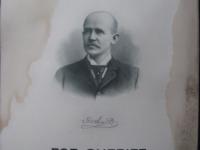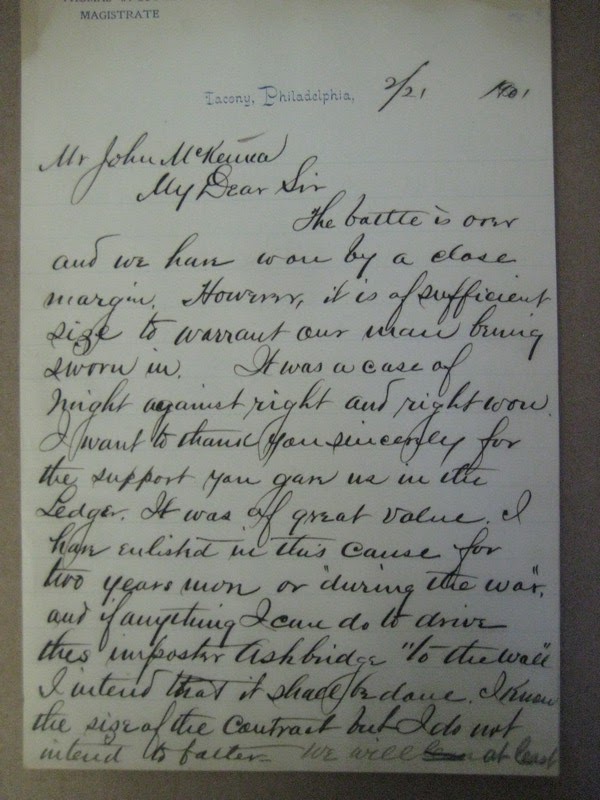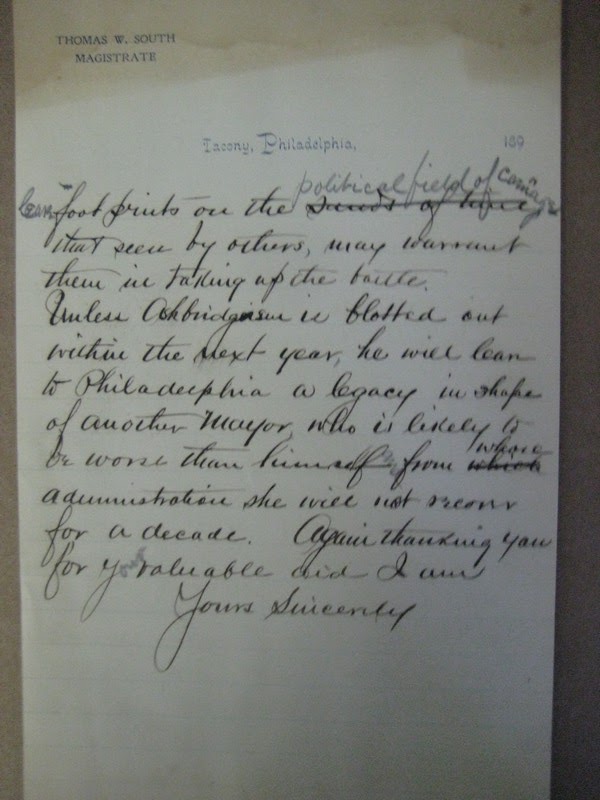Celia and I recently finished processing one on the highlights of the Historical Society of Tacony's collection: the Thomas W. South papers, 1861-1919. South was a prominent and influential figure in the Tacony section of Philadelphia as well as the city at large around the turn of the 20th century through his involvement in real estate, transportation, and local politics.
Many archival collections are found in basements and attic spaces-- the papers, and often their creators, long forgotten. The South papers did not wait for someone to find them, but clamored for attention on their own. Much to the surprise of a tenant, they fell through the attic of an apartment in the building that was Thomas South's residence during a heavy rain storm several decades after South had passed away. Luckily, the tenant happened to be active in the community, and wisely donated the papers to the Historical Society of Tacony.
Needless to say, the papers were a bit sooty by the time Celia and I began to process them.
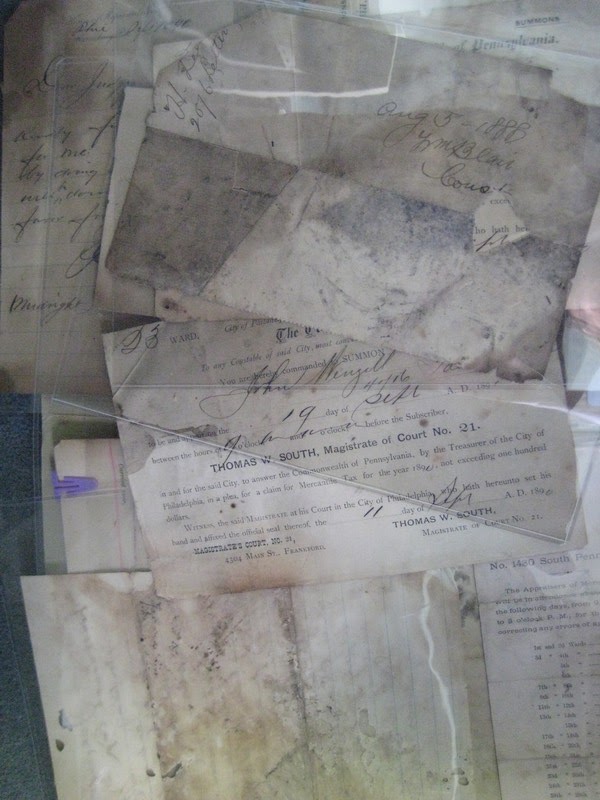
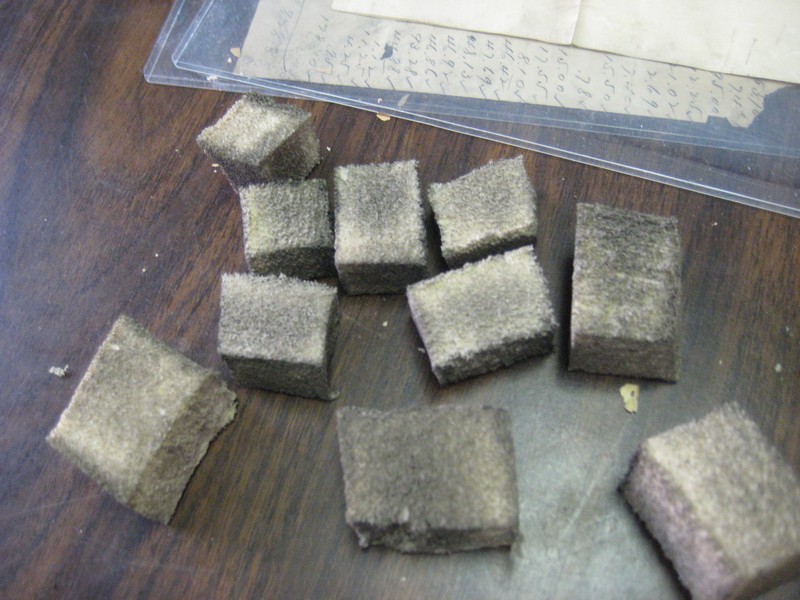
A relative of the Disston "Steel" family, Thomas Winfield South (1847-1922) moved from his native Ohio to Philadelphia to work for Disston & Sons Saw Works, one of the largest saw manufacturing companies in the world. He served as a manager and land-agent for the Disston-owned properties in the Tacony section of Philadelphia, overseeing the implementation of founder Henry Disston's paternalistic vision of Tacony as an ideal family-centered company town. He was quite influential in this capacity; in his obituary, the Philadelphia Evening Bulletin dubbed him the "Father of Tacony."
Aside from his work for Disston, South became heavily involved in Philadelphia real estate and transportation. South organized the Tacony Building and Loan Association, for which he worked as treasurer for 42 years; served as director of the Suburban Electric Company; and was one of the promoters of the Holmesburg, Frankford and Tacony Electric Railway.
A lifelong Republican aligned with the machinery of Philadelphia boss James McManes, South was also very active in local politics and government. By most accounts, South was an efficient judge and bureaucrat. In 1875, he was elected magistrate at the Central Police Court in Philadelphia, and was reelected to this post five times. He handled over 100,000 cases before retiring from magisterial duties in 1904. He was elected ward leader for the 41st Ward in 1901. Mayor John Weaver (1903-1907) appointed him Assistant Director of Public Safety in 1905 (though South and Director of Public Safety Sheldon Potter were forced to resign the following year). South was appointed to Chief Clerk of the Board of Mercantile Appraisers in 1907, a position he held until his death of a heart attack in 1922. South also served as a delegate to the convention that elected Rutherford B. Hayes for President.
An obituary characterized South's interests in politics as follows: "Having his position at the head of the world famous saw works, he wanted nothing for himself, but was eager to find good places for his protégés in politics... He represented a much higher intellectual type than the ordinary ward politician. He was proud of his personal reputation for integrity."
The collection, which primarily consists of correspondence and legal papers, documents South's work as magistrate, his engagement in the machinery of Philadelphia local politics, his personal and professional relationships with many individuals prominent in Northeast Philadelphia, his involvement with various businesses and organizations, and real estate development in the Tacony section of the city.
The following letters concern South's election as ward leader in 1901.
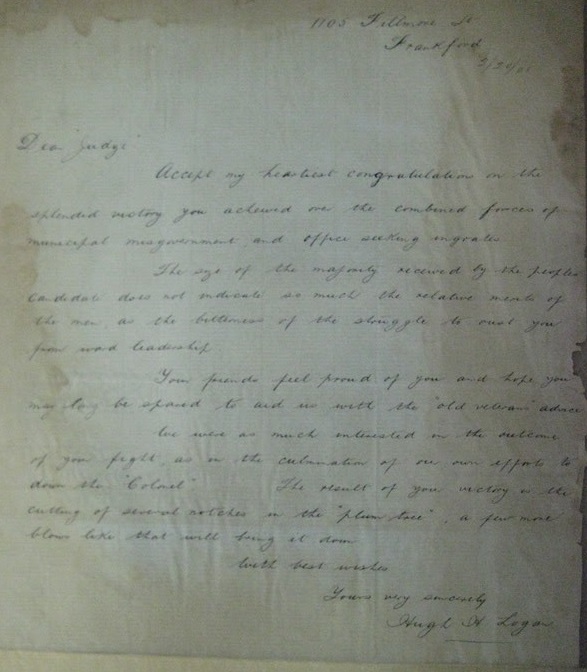
Hugh H. Logan to Thomas South, February 20, 1901
Dear "Judge"
Accept my heartiest congratulations on the splendid victory you achieved over the combined forces of municipal misgovernment, and office seeking ingrates.
The size of the majority received by the peoples candidate does not indicate so much the relative merits of the men, as the bitterness of the struggle to oust you from ward leadership.
Your friends feel proud of you and hope you may long be spared to aid us with the "old veterans" advice.
We were as much interested in the outcome of your fight, as in the culmination of our own effort to down the "Colonel". The result of your victory is the cutting of several notches in the "plum tree", a few more blows like that will bring it down.
With best wishes
Yours very sincerely,
Hugh H. Logan
Draft letter from South to John McKenna, February 21, 1901
Mr. John McKenna
My Dear Sir
The battle is over and we have won by a close margin. However, it is of sufficient size to warrant our man being sworn in. It was a case of might against right and right won. I want to thank you sincerely for the support you gave us in the Ledger1. It was of great value. I have enlisted in this cause for two years more or "during the war", and if anything I can do to drive this imposter Ashbridge2 "to the wall" I intend that it shall be done. I know the size of the contract but I do not intend to falter. We will at least leave footprints on thesands of timepolitical field of carnage that(?) seen by others, may warrant them in taking up the bottle.
Unless Ashbridgism is blotted out within the next year, he will leave to Philadelphia a legacy in shape of another mayor, who is likely to be worse than himself and from whose administration she will not recover for a decade. Again thanking you for your valuable aid I am
Yours sincerely
[Thomas South]
1The Public Ledger
2Samuel H. Ashbridge was mayor of Philadelphia from 1899 to 1903.
A fair amount of correspondence sheds light on Philadelphia's political climate and judicial system around the turn of the 20th century, including the corruption that plagued the city. Below is one of many examples from the collection in which South is asked to pardon an individual (or individuals) slated to face trial, or to "fix" a situation to shield those implicated in wrongdoings or unethical behavior.
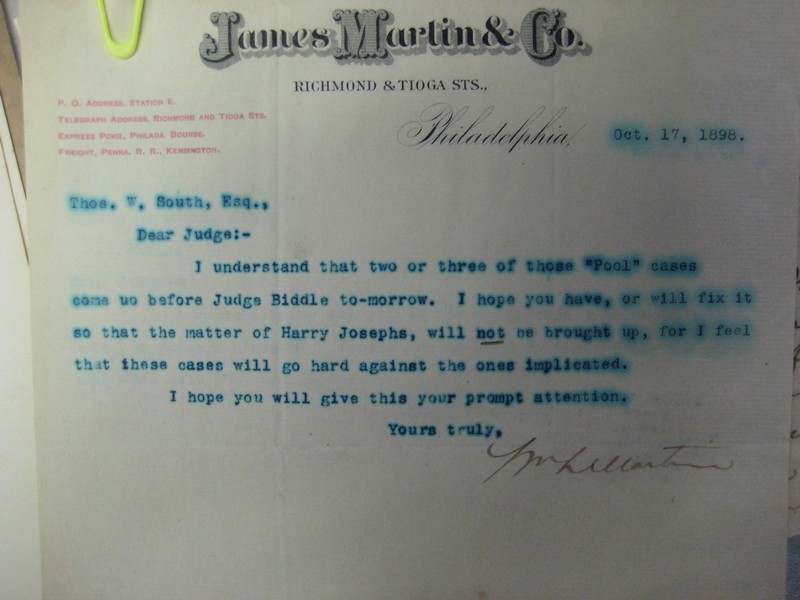
William Martin to South, October 17, 1898
Dear Judge:
I understand that two or three of those "Pool" cases come up before Judge Biddle to-morrow. I hope you have, or will fix it so that the matter of Harry Josephs, will not be brought up, for I feel that these cases will go hard against the ones implicated.
I hope you will give this your prompt attention.
Yours Truly,
William L. [?] Martin
Interestingly, the Thomas W. South papers also document the development boom in central Florida during the early 20th century. Around the late 19th century, many wealthy Philadelphians who suffered from ill health began vacationing in Florida, hoping that the climate would improve their symptoms. These excursions inspired some to invest in the largely undeveloped state. South, for instance, who suffered from rheumatism and frequently traveled to St. Lucie, became interested in Florida land development. He was likely encouraged in this by his cousin and close friend, Hamilton Disston (1844-1896), the largest single investor in Florida's history.
Along with some items in South's personal papers, the collection contains the correspondence of the St. Petersburg Investment Company, an organization founded by Hamilton Disston's brother, Jacob, and a group of Philadelphia investors --including publisher Frank A. Davis (1850-1917)--to finance development projects in and around Disston lands in Florida, including railway, electricity, and building construction
Much of the correspondence is routine in nature, covering the day-to-day activities of the company. Many letters are to and from contractors, builders, electricians, banks, and other businesses with which the company dealt as well as some letters to company shareholders (including a fair number of women investors.) Some relate to the company's absorption of the Florida West Coast Company in 1909.
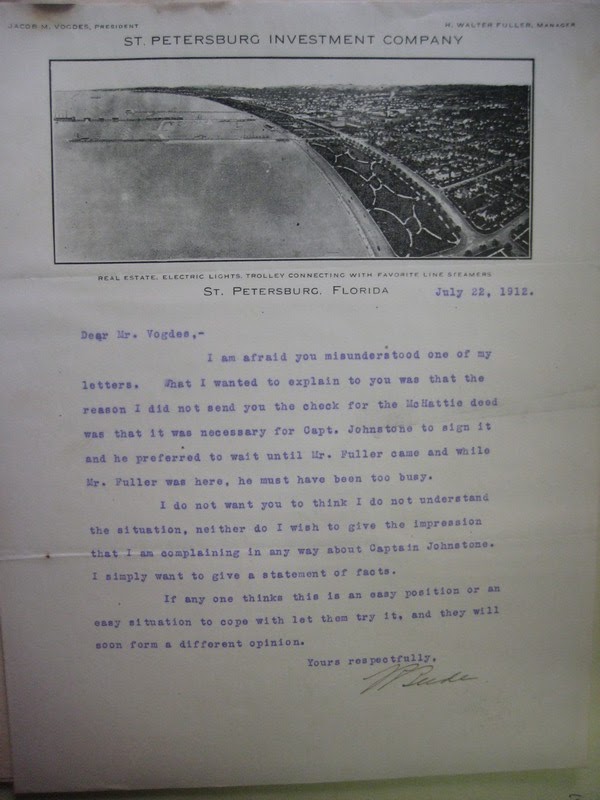
Letter from Ruth Beede, who worked in the company's Florida office, to Pres. Jacob M. Vodges, July 22, 1912
Now that the Thomas W. South papers are processed (and much less sooty), researchers can dive into this intriguing collection that documents several aspects of Philadelphia history around the turn of the 20th century, including politics and the judicial system, real estate and infrastructure, and particularly the development of the northeast section of city. Beyond Philadelphia, researchers can also learn about the development of Florida that was spearheaded by several wealthy industrialists from the city of brotherly love seeking better health and more wealth. Make your appointment with the Historical Society of Tacony to view the South papers today!

